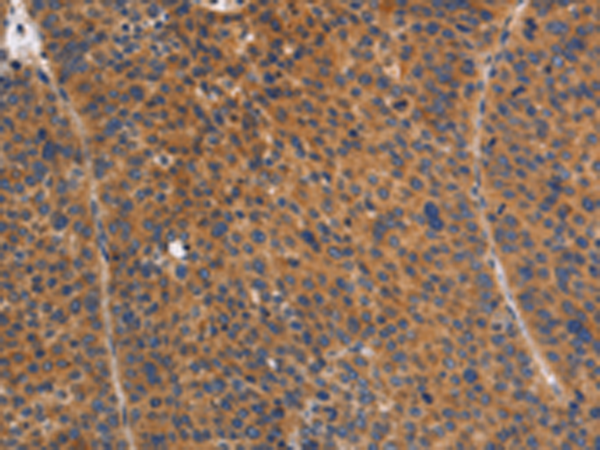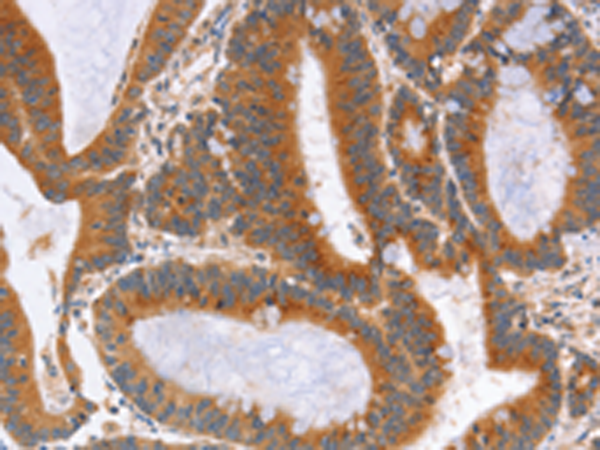

| WB | 咨询技术 | Human,Mouse,Rat |
| IF | 咨询技术 | Human,Mouse,Rat |
| IHC | 1/50-1/200 | Human,Mouse,Rat |
| ICC | 技术咨询 | Human,Mouse,Rat |
| FCM | 咨询技术 | Human,Mouse,Rat |
| Elisa | 1/1000-1/5000 | Human,Mouse,Rat |
| Aliases | CARD4; NLRC1; CLR7.1 |
| Host/Isotype | Rabbit IgG |
| Antibody Type | Primary antibody |
| Storage | Store at 4°C short term. Aliquot and store at -20°C long term. Avoid freeze/thaw cycles. |
| Species Reactivity | Human, Mouse |
| Immunogen | Synthetic peptide of human NOD1 |
| Formulation | Purified antibody in PBS with 0.05% sodium azide and 50% glycerol. |
+ +
以下是3篇关于NOD1抗体的代表性文献摘要概括(注:文献为示例性内容,实际文献需通过数据库核实):
1. **文献名称**: "NOD1 participates in the innate immune response to bacterial infection"
**作者**: Ting, J.P. et al.
**摘要**: 该研究利用NOD1特异性抗体在小鼠模型中验证了NOD1蛋白在识别革兰氏阴性菌肽聚糖中的作用,发现其通过激活NF-κB通路触发炎症反应,抗体阻断实验表明NOD1缺失会导致宿主防御能力下降。
2. **文献名称**: "NOD1 regulates autophagy to control intracellular bacteria"
**作者**: Travassos, L.H. & Carneiro, L.A.
**摘要**: 通过免疫沉淀和Western blot技术结合NOD1抗体,揭示了NOD1在自噬通路中的调控功能,证明其通过招募ATG16L1蛋白促进细胞内病原体(如沙门氏菌)的清除。
3. **文献名称**: "Antibody-mediated targeting of NOD1 inhibits inflammation in a murine colitis model"
**作者**: Watanabe, T. et al.
**摘要**: 研究开发了一种靶向NOD1的中和性单克隆抗体,在结肠炎小鼠模型中证实其可通过抑制NOD1/RIP2信号通路显著减轻肠道炎症,为炎症性肠病治疗提供潜在策略。
4. **文献名称**: "NOD1 activation in dendritic cells promotes Th17 differentiation"
**作者**: Magalhaes, J.G. et al.
**摘要**: 使用NOD1抗体进行流式细胞术和免疫荧光分析,发现树突状细胞中NOD1的激活通过IL-6/IL-23轴驱动Th17细胞分化,提示其在自身免疫疾病中的病理机制。
(提示:以上文献信息为示例性内容,实际研究需通过PubMed/Google Scholar以"NOD1 antibody"、"NOD1 immune response"等关键词检索获取)
NOD1 (Nucleotide-Binding Oligomerization Domain-Containing Protein 1) is an intracellular pattern recognition receptor (PRR) belonging to the NLR (NOD-like receptor) family. It plays a critical role in innate immunity by detecting conserved bacterial components, particularly γ-D-glutamyl-meso-diaminopimelic acid (iE-DAP), a peptidoglycan fragment found in Gram-negative and certain Gram-positive bacteria. Upon ligand recognition, NOD1 oligomerizes and recruits downstream signaling adaptors like RIP2 (RIPK2), activating NF-κB and MAPK pathways to induce pro-inflammatory cytokine production and antimicrobial responses. This receptor is expressed in various cell types, including epithelial cells and immune cells, and contributes to host defense, tissue homeostasis, and immune regulation.
NOD1 antibodies are essential tools for studying its expression, localization, and function in immune responses. They enable researchers to detect NOD1 protein levels via techniques like Western blotting, immunohistochemistry, and flow cytometry, or to inhibit its activity in mechanistic studies. Dysregulation of NOD1 signaling has been implicated in chronic inflammatory diseases (e.g., inflammatory bowel disease), autoimmune disorders, and cancer, making these antibodies valuable for exploring disease mechanisms. Commercially available NOD1 antibodies include monoclonal and polyclonal variants, often validated for specificity in human, mouse, or rat models. Recent studies also investigate NOD1's role in non-infectious contexts, such as metabolic disorders and neuronal inflammation, highlighting its broader therapeutic potential. However, challenges remain in standardizing antibody performance across experimental conditions and avoiding cross-reactivity with related NLRs like NOD2.
×